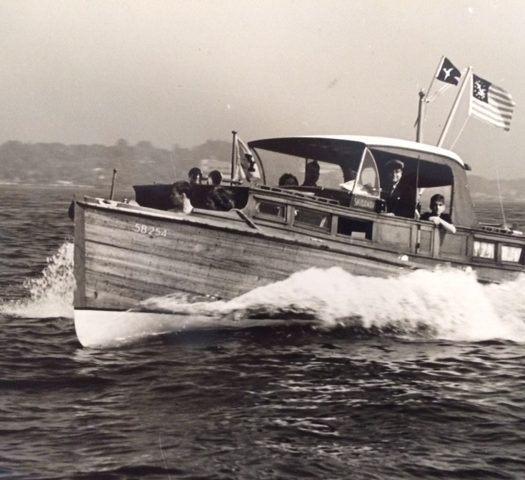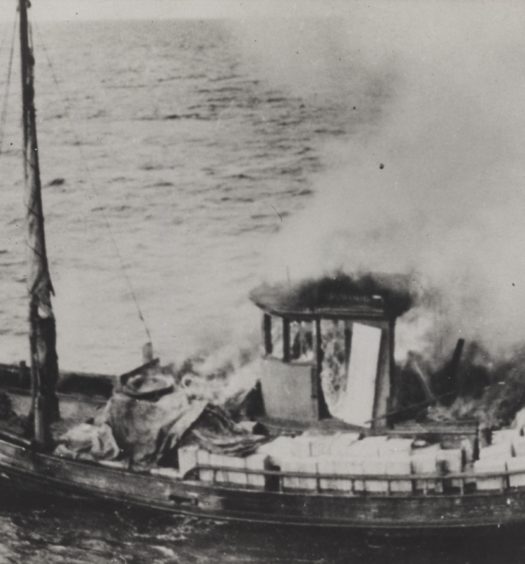[Editor’s note: When interviewed in 1991, Ron Deaver was 97 years old and resided in a nursing home. Some sixty years earlier, in early 1930s Rhode Island, he actively participated in the “whiskey business.” The problem was that it was during the time of Prohibition, when selling alcohol was illegal under federal law. When asked, Deaver refused to specify how much money he made bootlegging during Prohibition, saying only that “it was more than $100,000 but it wasn’t enough.” This interview of Deaver appeared in the December 1991 edition of the Old Rhode Island magazine. It is possible “Ron Deaver” is a fictitious name used to hide his true identity, as I found no records of him online or in Providence telephone directories. I would appreciate hearing from any reader who has any information about him.]
Hell, we didn’t have any choice. There weren’t no jobs, and if you did find a place that was hiring, there would be 500 people lined up in front of you . . . all wanting the same job. It was the time of the Depression. I lived with my sister and her husband for a while and I was waiting tables in a restaurant. I made $9.36 the first week. This was during Prohibition, and it didn’t take me long to figure that people were more interested in drinking than eating. I made a connection with old man Giles, and he would let me have five or six half pints on credit. I would then go to work, put one of the bottles in my pocket, and as I waited tables, I would drop a hint that I could get them some liquor if they wanted. I made 35 cents on every half pint at first, but it wasn’t long before I got the price up.

A deck-load of liquor on board a supply ship for rum runners off the coast of New York, with cases and barrels of alcohol ready for quick transfer (National Archives)
In a month or two, I had become one of Giles’ best customers and he offered me a job with a percentage if I would go in with him. Giles had a small bootlegging setup and he catered to people that wanted only a couple of bottles or so for their own use. There was a lot of money in Newport at the time, so I talked old man Giles into letting me wholesale to some restaurants and joints on credit. We’d give them credit, they would buy from us, and we’d have a guaranteed volume every month, with less trouble.
It worked real good for a while. I bought a ’31 Ford Coupe, new clothes and I was living the good life. There was a lot of competition in the business back then and a lot of deals being made. Unfortunately, Giles didn’t want any more partners, so after much “negotiation,” Giles ended up missing and I ended up with no job.
A couple of days after Giles disappeared, these guys from New York approached me about going to work for them. They offered me $75 a week, along with a percentage, and my job was the same as before, except they supplied all the liquor. They also had all the top names of Scotch.
There was a Congressman back then who had voted for Prohibition and was going all over the country making speeches. Anyway, he had this home in Newport and every time he was here, I used to have to deliver him three or four cases of Scotch. Later we would use his boat to unload liquor from the ships.
I had a good head for figures and it wasn’t long before I got offered another job. This job, all I had to do was count the cases as they were being unloaded, and make sure the correct amount was loaded on other trucks. We had this warehouse downtown [in Providence], about four or five blocks from the capitol, that we used for storage. I’ve seen so many trucks lined up waiting to get in there to unload or to pick up new loads, that the traffic would be blocked all the way to the capitol, and they would have to get police to direct traffic.
At first, most of the liquor came in from New York or Canada, but after a while they got to bring it in by the shipload. The ships would anchor right outside the seven mile limit, and smaller boats would go out and take on loads. Sometimes, if you couldn’t find the brand you needed, you would go shopping out there. You would pull up next to one of the ships, ask them what brands they had and how much it was. Some of the ships would actually fly a pennant showing what they had on board. Everyone’s favorite was the “Johnny” ship. It had a large pennant, must have been 20 or 25 feet long flying from the bridge, with the words “Johnny Walker…Imported” on it.
Got to where there was so many ships out there it looked like we were being invaded.

On January 19, 1919, the 18th Amendment to the U.S. Constitution went into effect, stating that “no person shall manufacture, sell, barter, transport, import, export, deliver, furnish or possess any intoxicating liquor.” (U.S. Coast Guard)
There was a picture in the New York Times one time that showed this picture of a politician at a garden party in Newport, and below the picture it said “Prohibition is working.” In the background of the picture, way out on the horizon was two ships, waiting to unload.
I was making good money when I met a young lady, who’s now my wife, who told me to make my choice: whiskey or her. I collected the money owed me and closed out some more deals I had going, and got out of the business. That was the best decision of my life. We took the money that I had made and bought a restaurant (after Prohibition it became a nightclub).
I knew almost all the guys from back then, but not many is around now. A lot of them got sent up [to prison], a few got killed, and some just disappeared. It’s been a long time ago.
No, I don’t feel bad about getting my start off the whiskey business. It’s what I did for a living, and I was good at it. I have nothing to be ashamed of. Take a drive down by the shore, and look at the big homes . . . where do you think some of them got the money? Or go to Washington . . . a lot of their families got their money the same way.
[Banner Image: A deck-load of liquor on board a supply ship for rum runners off the coast of New York, with cases and barrels of alcohol ready for quick transfer (National Archives)]

























